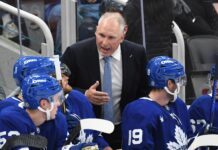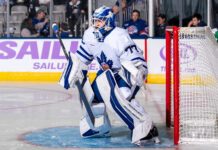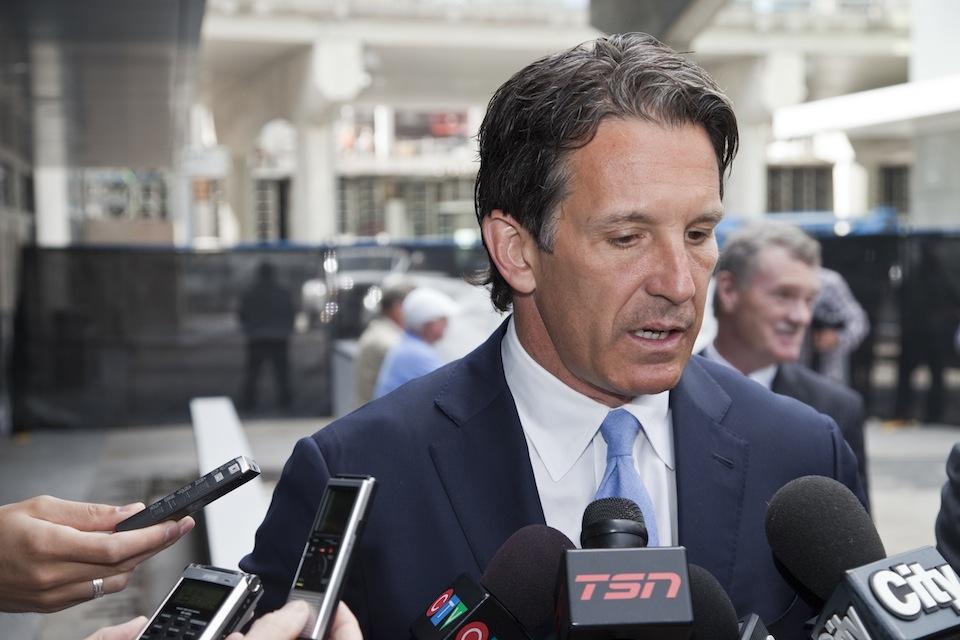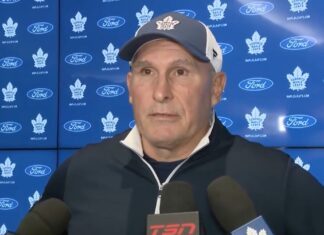Toronto Maple Leafs President Brendan Shanahan joined TSN Overdrive on Tuesday, discussing the team’s new signings, heightened expectations for 2017-18, the captaincy situation, and more. Full transcript below.
Each one of your three seasons has been so drastically different. How do you look back on three years on the job?
Shanahan: It’s flown by. There is just a whole lot more interesting people for you guys to talk to, so that’s good. I’m happy with that.
Going back over the first three years – the first year you came in and you almost kind of sat back and just assessed everything. How drastically different has every year been in your tenure so far?
Shanahan: I think that’s one of the things that keeps people energized in hockey and keeps people in the game – that every season is different. It’s not a job that ever gets boring because there are new challenges and new variables that come into play. In the first season — I was laughing telling this story – after 100 days, an article came out and it said, “it’s business 101 that you get the 100-day rule. You see how much a guy has done after 100 days.” I thought to myself, “No one told me about this 100-day rule.” It was a lot of patience and it was difficult being patient at times. I was just trying to assess what we had. If you look at the team we have today, there are a lot of players in our lineup now that were part of the organization back then. It wasn’t just a cleaning house process. It was seeing what was going to work and what we had on the team and what we had in the system that was already in place.
What’s also changed year over year is the expectations from the outside. You guys had a great year last year and made the playoffs. People are really fired up for this season. How comfortable are you with the elevated expectations going into this year?
Shanahan: If you want to be in this business and you want to be successful, you are going to have to, at some point, be ready to deal with higher expectation. That just comes with the territory. There is a lot of optimism in the city, certainly, and we understand that. But we’re staying pretty focused and Mike Babcock and Lou are fantastic, and so are our players, on being focused on the fact that there is a lot of hard work ahead. When you look at the Marlies and what Sheldon Keefe has done for us in getting players ready and what Kyle Dubas has done in getting players ready, it has been a full organizational push to ignore either the negative things being said or the positive things being said about us, and just staying focused on the job.
You guys brought in a few different vets this offseason. You were one of the youngest teams in the league last year. Was that a priority going into the year or were these guys just the right fit and it’s a coincidence what their age happens to be?
Shanahan: I think the latter. They were players that we wanted and identified. We didn’t look at their birth certificate and say, “Oh, they’re pretty good players, too.” They’re players that we thought filled needs for us. The fact that they’re a little bit older than the rest of the guys was not really one of our first considerations. We felt that all three of them still had hockey left in them and could contribute to our team.
Based on your experience – 10 years in Detroit, then you move onto a new team – what did you learn from that experience that you would want Patrick Marleau to know?
Shanahan: That it’s really hard to leave, especially a place that you’re comfortable in. At some point in your career, a new challenge and you get to reinvent yourself and you surround yourself with a bunch of young players – sometimes it can re-energize you and you can have a lot of fun. I remember, for me early in my career, I saw Bryan Trottier do that, where he went to Pittsburgh and he played a smaller role and he wasn’t expected to be Bryan Trottier: The Leader of the Islanders. He was just a veteran guy that was providing some leadership and some experience and some playoff experience. He was there for at least one Cup, if not for both of them. I think that being around the young players – they will really look up to him. He’s a guy that we’re very comfortable having our players look at and just see how he prepares himself on a day-to-day basis.
As for the younger kids, there was so much talk forever about Toronto kids playing for the Leafs and how they would react to it. You’ve got Marner who is from here, and Brown and Hyman. They’ve walked in, they’ve performed, and they’ve handled the media pressure. What is the next step? What is the next hurdle for the local kids?
Shanahan: I don’t think that their hurdles are any different than any of their teammates’. I think that they just want to keep getting better. They enjoy playing in Toronto. I think that the Toronto fans enjoy the team. There is a good back and forth and a good relationship. I think that the players lean on each other and support each other. They’ve helped to create a very positive environment. You’re going to have – in any season, especially if you have a core group of players that stay together for a while – highs and lows and ups and downs. They have to expect that. That’s why you have veteran players and veteran people around them to help them prepare for things like that. Overall, they’re creating their own environment here. They’re creating a space where players – either FAs from Europe or FAs in the NHL – are seeing Toronto as a different destination than maybe they did a few years ago.
As for Matthews and the role he’s played in that – he wins rookie of the year and he scores 40, and yet the expectations will rise for him as well. What is the next level for him? How would we know it happened?
Shanahan: What’s impressed me about a lot of our players… no matter what your coaches or management tell you to do, the best kind of pressure is peer pressure. When you’ve got that leadership from within with players pushing each other to be fitter and stronger and more committed, to work on skills, to sacrifice for the team and to be selfless — that’s when you’ve got something special. That’s what’s impressed me about Auston as well as a lot of the players on our team: I do see them working on the little things. They’re recognizing that we’re here to win. We’re here to build a winning team. This isn’t about individual trophies. I hear stories about them working out in the offseason and doing things that are going to make them more complete hockey players; players that can play in all situations on the ice. When I hear that – if they continue to be that way – we have something special.
You’ve been drilled a hundred times on the question of whether or not there are plans to announce a captain. Obviously, Auston Matthews is front and center. Do you have a plan behind the scenes or are you just going to play it by ear depending on how you feel he continues to progress in the second year within that leadership core? Where do you guys stand? Is there a plan in place? Is it just going to be a timing thing when it comes to naming a captain?
Shanahan: It’s not going to be my decision. This is a coaching decision and a GM decision. All I would say is: On any team you’ve probably ever been on, it’s less about having a captain and more about having natural leaders in the room. When the time is right, I’m sure Mike and Lou will make a decision like that. In the meantime, I would be happy if every guy in that room stood up at different moments and took on a leadership role.
One of the things you’ve really focused on since you came aboard was amplifying the history of the team. Legends Row was a big part of that. It seems to me you’ve got a lot more former Leaf players kicking around the building and kicking around different events. Do you feel like fans have a better appreciation for the team’s history since you came aboard?
Shanahan: I don’t think it’s since I came aboard. I think that the team has performed better and guys enjoy that. If you are a Leafs alumni and you are living in this area, you take a lot of pride in how the team is playing. I think our games have become more fun and more entertaining. You can look down on the ice and see a group of players that you can envision growing with. I think that’s one of the reasons they’re around more.
Our alumni are incredibly important to me. First and foremost, I grew up a fan of many of them. That doesn’t escape me even when we bump into each other and say hello. I’m thinking in the back of my mind, “Oh my god, Billy D, Darryl, Lanny!” These are guys that I looked up to, and now I get to see them in a working relationship. But our alumni have got great leadership. They’re really important to us. I think you saw in the Centennial Classic last year, when our players got a chance to get dressed in the same dressing room with them, there was a lot of fun give-and-take between the two sides. I think it’s really important to see that you’re playing for something bigger than just yourself. If you see this the right way, it can be a huge motivation.
You guys made it official that December 19th at 2 p.m. you’re going to be playing. The jerseys look pretty good. Take us through this idea and how it all came about.
Shanahan: For a lot of the 100th season, we have been focusing on celebrating our history and shining a light on some of our great players that have played in the top 100; taking the honoured jerseys and doing what a lot of the alumni thought was the right thing to do, which is to retire the sweater numbers. This is an opportunity for us. On December 19th, it is the actual official birthday and sort of the end of the one-year celebration. It is officially when we switch over to 001. The focus was that we are hoping we will fill the arena with as many young people and new fans as possible. The birthday comes on a Tuesday, and rather than do a typical game on a Tuesday night on a school night, we are playing the game at 2 p.m. against Carolina and we are hoping that as many fans as possible that can’t make it will give their tickets to or bring a young person to the game. That is the whole hope and feel we have for that arena that game — just filling it with young kids; that next generation of hockey fans.



![Craig Berube on Nick Robertson joining William Nylander’s line: “If he gets to a good area on the ice, [Nylander] can find him… He has to put a couple in and get some confidence” Craig Berube, Toronto Maple Leafs head coach](https://mapleleafshotstove.com/wp-content/uploads/2024/10/berube-leafs-prac-218x150.jpg)





















![Craig Berube on Nick Robertson joining William Nylander’s line: “If he gets to a good area on the ice, [Nylander] can find him… He has to put a couple in and get some confidence” Craig Berube, Toronto Maple Leafs head coach](https://mapleleafshotstove.com/wp-content/uploads/2024/10/berube-leafs-prac-100x70.jpg)







